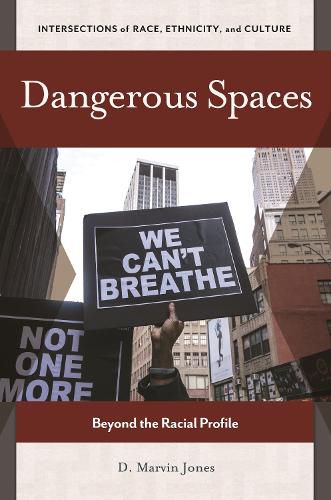Readings Newsletter
Become a Readings Member to make your shopping experience even easier.
Sign in or sign up for free!
You’re not far away from qualifying for FREE standard shipping within Australia
You’ve qualified for FREE standard shipping within Australia
The cart is loading…






An eye-opening, unapologetic explanation of what racial profiling is in modern-day America: systematic targeting of communities and placing of suspicion on populations, on the basis of not only ethnicity but also certain places that are linked to the social identity of that group.
In 21st-century, post-civil rights era America, race has become complex and intersectional. It is no longer simply a matter of color-black versus white-contends author D. Marvin Jones, but equally a matter of space or geographies of fear, which he defines as spaces in which different groups are particularly vulnerable to stereotyping by law enforcement: blacks in the urban ghetto, Mexicans at the functional equivalent of the border, Arabs at the airport.
Dangerous Spaces: Beyond the Racial Profile demonstrates how society has constructed a set of threat narratives in which certain widespread problems-immigration, drugs, gangs, and terrorism, for example-have been racialized and explains the historical and social origins of these racializing threat narratives. The book identifies how these narratives have led directly to relentless profiling that results in arrest, deportation, massive surveillance, or even death for members of suspect populations. Readers will come to understand how the problem of profiling is not merely a problem of institutional bias and individual decision making, but also a deeply rooted cultural issue stemming from the processes of meaning-making and identity construction.
Offers a novel framework for understanding the problem of racial profiling that explains how profiling actually involves the intersection of race and space
Provides concrete solutions in the form of a civil rights restoration act that addresses the problem of racial profiling through a set of innovative community controls on the deployment and power of police
Constitutes essential reading for students, lawyers, journalists, and teachers interested in issues of race and ethnicity as well as general readers wanting to learn about racial profiling in American society
$9.00 standard shipping within Australia
FREE standard shipping within Australia for orders over $100.00
Express & International shipping calculated at checkout
An eye-opening, unapologetic explanation of what racial profiling is in modern-day America: systematic targeting of communities and placing of suspicion on populations, on the basis of not only ethnicity but also certain places that are linked to the social identity of that group.
In 21st-century, post-civil rights era America, race has become complex and intersectional. It is no longer simply a matter of color-black versus white-contends author D. Marvin Jones, but equally a matter of space or geographies of fear, which he defines as spaces in which different groups are particularly vulnerable to stereotyping by law enforcement: blacks in the urban ghetto, Mexicans at the functional equivalent of the border, Arabs at the airport.
Dangerous Spaces: Beyond the Racial Profile demonstrates how society has constructed a set of threat narratives in which certain widespread problems-immigration, drugs, gangs, and terrorism, for example-have been racialized and explains the historical and social origins of these racializing threat narratives. The book identifies how these narratives have led directly to relentless profiling that results in arrest, deportation, massive surveillance, or even death for members of suspect populations. Readers will come to understand how the problem of profiling is not merely a problem of institutional bias and individual decision making, but also a deeply rooted cultural issue stemming from the processes of meaning-making and identity construction.
Offers a novel framework for understanding the problem of racial profiling that explains how profiling actually involves the intersection of race and space
Provides concrete solutions in the form of a civil rights restoration act that addresses the problem of racial profiling through a set of innovative community controls on the deployment and power of police
Constitutes essential reading for students, lawyers, journalists, and teachers interested in issues of race and ethnicity as well as general readers wanting to learn about racial profiling in American society